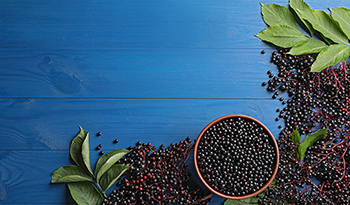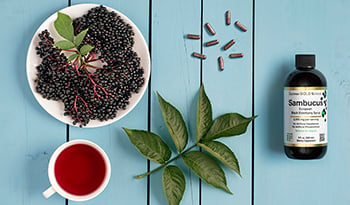I 7 migliori integratori per il sistema immunitario dei bambini

Punti chiave
- Prima di tutto le basi: una dieta equilibrata, un sonno adeguato e una buona igiene sono i fattori più importanti per la salute del sistema immunitario del bambino.
- Integratori chiave: gli integratori con maggiori evidenze scientifiche per il sistema immunitario dei bambini sono la vitamina C, la vitamina D, lo zinco e i probiotici.
- Quando usarli: gli integratori possono essere particolarmente utili durante il rientro a scuola, nei mesi invernali o se tuo figlio è schizzinoso col cibo.
- La sicurezza prima di tutto: consulta sempre il pediatra prima di iniziare qualsiasi nuovo integratore e scegli prodotti specificamente formulati per i bambini.
Sostenere le difese immunitarie
Un sistema immunitario forte è fondamentale per mantenere i bambini in salute e farli crescere bene. Dall'aula al parco giochi, i bambini entrano in contatto ogni giorno con molti nuovi batteri, virus e altri microbi. Quando il loro sistema immunitario funziona correttamente, li aiuta a combattere il raffreddore comune, l'influenza e altre infezioni, permettendogli di crescere, imparare e vivere al meglio. Poiché le difese dei bambini sono ancora in fase di sviluppo, assicurarsi che abbiano la giusta alimentazione e il supporto di integratori alimentari fondamentali può fare molto per costruire una salute duratura.
I migliori integratori per il sistema immunitario dei bambini
I genitori possono aiutare a rafforzare il sistema immunitario dei propri figli con l'uso di integratori alimentari fondamentali. Ecco i sette migliori:
1. Vitamina A: la vitamina "anti-infettiva"
La vitamina A o retinolo è stata la prima vitamina liposolubile scoperta, ma non è l'unico motivo per cui è stata chiamata "A". Il suo nome deriva dalle sue proprietà "anti-infettive". La vitamina A è fondamentale per la salute e la funzione delle cellule della pelle e delle membrane mucose che agiscono come prima linea di difesa contro le infezioni.
La vitamina A è inoltre necessaria per il corretto funzionamento dei globuli bianchi e favorisce molte attività del sistema immunitario, tra cui la funzione del timo, l'attività antitumorale e la risposta degli anticorpi. La vitamina A è particolarmente importante per combattere i virus.
Ad esempio, è stato riscontrato che livelli più bassi di vitamina A rendono le persone molto più soggette alle infezioni virali del tratto respiratorio. Inoltre, esistono numerose prove scientifiche che dimostrano come l'integrazione di vitamina A nei bambini produca benefici significativi nel miglioramento della funzione immunitaria durante un'infezione virale.
È stato dimostrato che l'integrazione di vitamina A è fondamentale per migliorare la salute dei bambini in molte parti del mondo.1
2. Zinco: il "guardiano" del sistema immunitario
Lo zinco è definito il "guardiano" del sistema immunitario, poiché è direttamente coinvolto in molti aspetti della funzione immunitaria. Quando i livelli di zinco sono bassi, l'immunità si riduce notevolmente a causa del crollo dei livelli di globuli bianchi specifici che combattono i virus, nonché della diminuzione degli attivatori del sistema immunitario e degli ormoni della ghiandola del timo, la principale ghiandola di controllo del sistema immunitario.
Lo zinco può anche agire direttamente contro alcuni virus, come quelli che causano il raffreddore comune. Inoltre, lo zinco è fondamentale per mantenere sane le mucose respiratorie e gastrointestinali, nonché per il corretto assorbimento dei nutrienti nell'intestino. Se lo zinco non è presente in quantità sufficienti, l'intero sistema immunitario viene compromesso e il rischio di infezioni aumenta drasticamente.3-5
Lo zinco è disponibile in molte forme, tra cui compresse, capsule e pastiglie.
3. Vitamina C: la chiave del sistema immunitario
La vitamina C è l'integratore alimentare a cui la maggior parte delle persone pensa quando si parla di supporto immunitario, soprattutto in caso di raffreddore.
Come altri nutrienti essenziali, la vitamina C è fondamentale per il funzionamento del sistema immunitario. La vitamina C è fondamentale per sostenere le barriere fisiche contro le infezioni, come la pelle e le mucose. La vitamina C attiva letteralmente i globuli bianchi per attaccare gli intrusi e potenzia l'interferone, il composto antivirale dell'organismo. Favorisce inoltre la produzione di anticorpi e la secrezione di ormoni del timo.6
Come lo zinco, la vitamina C può aiutare i meccanismi di difesa dell'organismo contro i virus, ed è uno dei motivi per cui viene utilizzata per combattere il raffreddore. Durante un'infezione o in caso di stress, il fabbisogno di vitamina C aumenta. Il calo dei livelli di vitamina C causato dallo stress è uno dei motivi per cui le persone sono più suscettibili al raffreddore comune durante eventi o situazioni stressanti.7
La vitamina C è disponibile in tutte le forme di integratori alimentari, con molti prodotti specificamente formulati per neonati e bambini.
4. Vitamina D: supporto per le ossa e il sistema immunitario
Sebbene la vitamina D possa essere prodotta nella nostra pelle attraverso l'effetto dei raggi UV del sole e tramite alimenti come i latticini arricchiti e i pesci grassi, l'assunzione di un integratore di vitamina D3 è importante per garantire livelli adeguati, soprattutto nei bambini. E non solo per il sistema immunitario, ma anche per la salute delle ossa.
È stato dimostrato che la vitamina D3 produce un'ampia gamma di effetti immunostimolanti. Diversi ampi studi hanno dimostrato che le persone con livelli ematici più elevati di vitamina D3 e quelle che assumono la vitamina D3 come integratore hanno un tasso ridotto di infezioni virali del tratto respiratorio.8,9
In una meta-analisi pubblicata sul British Medical Journal, i dati di 25 studi randomizzati e controllati con un totale di 11.321 partecipanti, di età compresa tra i neonati e le persone di 95 anni, hanno rilevato che nei soggetti con bassi livelli ematici di vitamina D3 che assumevano un integratore di D3, si è verificata una riduzione del 70% delle infezioni del tratto respiratorio.8
Raccomandazioni sul dosaggio:
- Per i bambini di età inferiore ai 5 anni, consiglio circa 50 UI per chilo al giorno.
- Per i bambini dai 5 ai 9 anni, consiglio 2.000 UI al giorno.
- Per i bambini dai 9 ai 12 anni, consiglio 2.500 UI al giorno.
- Per i bambini di età superiore ai 12 anni, consiglio il dosaggio per adulti di 2.000-5.000 UI al giorno.
5. Acidi grassi omega-3: il fondamento delle membrane cellulari
Gli acidi grassi omega-3 a catena lunga EPA (acido eicosapentaenoico) e DHA (acido docosaesaenoico) presenti negli integratori di olio di pesce e di alghe svolgono un ruolo importante nello sviluppo della funzione immunitaria dei bambini.
La loro funzione principale è quella di componenti delle membrane cellulari. Il DHA e l'EPA funzionano nelle membrane dei globuli bianchi (linfociti T, linfociti B, macrofagi) per migliorare la segnalazione e la comunicazione cellulare. Questa funzione di base permette alle cellule immunitarie di rispondere in modo più efficiente quando necessario. Aiutano inoltre i globuli bianchi a sviluppare risposte immunitarie anticorpali e cellulo-mediate efficaci, assicurando che la risposta immunitaria sia equilibrata. L'EPA e il DHA sono importanti anche nella regolazione dell'infiammazione, fondamentale per proteggere dai danni ai tessuti. Questo equilibrio è particolarmente importante nei bambini, che stanno ancora sviluppando la tolleranza all'esposizione a nuovi microbi e minacce ambientali.10
Studi preliminari condotti sui bambini dimostrano che una maggiore assunzione di omega-3 è associata a un minor numero di infezioni respiratorie e a una minore incidenza di allergie. Questi risultati evidenziano l'importanza dell'EPA e del DHA nella regolazione della funzione immunitaria.10,11
Per i bambini, ecco le mie raccomandazioni per l'assunzione giornaliera:
- Bambini 0-2 anni: 200-300 mg/giorno (almeno 100 mg di DHA)
- Bambini 2-6 anni: 200-300 mg/giorno (≥60% EPA)
- Bambini 6-12 anni: 500-1.000 mg/giorno (≥60% EPA)
- Bambini > 12 anni: 1.200-2.000 mg/giorno (≥60% EPA)
6. Probiotici: gli eroi della salute intestinale
Lo sapevi che più del settanta per cento del sistema immunitario risiede nel tratto gastrointestinale umano?
I probiotici sono batteri, lieviti e altri microrganismi benefici che abitano il tratto intestinale umano. I probiotici possono essere utili per promuovere la salute del "microbioma", l'insieme del patrimonio genetico dei microbi che ospitiamo nel nostro corpo. Il microbioma intestinale umano svolge un ruolo enorme nella salute generale, in particolare nella capacità funzionale del nostro sistema immunitario.
Gli integratori probiotici contengono forme vive liofilizzate di batteri o lieviti benefici in capsule, liquidi o alimenti. Questi integratori sono stati ampiamente studiati per la loro capacità di sostenere la funzione immunitaria, soprattutto nell'infanzia. I loro benefici derivano in gran parte dal modo in cui interagiscono con il microbioma intestinale, che svolge un ruolo centrale nella regolazione del sistema immunitario. Gli integratori probiotici sostengono anche la salute del sistema immunitario rafforzando la barriera intestinale, bilanciando le risposte immunitarie, aumentando la produzione di anticorpi e riducendo il rischio di infezioni. I benefici sono specifici per ogni ceppo: le specie di Lactobacillus e Bifidobacterium sono quelle più studiate per gli effetti sul sistema immunitario.12-14
Molti produttori di probiotici offrono prodotti formulati per i bambini, specifici per età e sesso, o per altri indicatori. I risultati migliori si ottengono generalmente assumendo tra i 5 e i 20 miliardi di organismi vitali al giorno. Si consiglia di utilizzare integratori probiotici con ceppi definiti e testati in studi clinici sull'uomo.
7. Beta-glucani del lievito: potente supporto per i globuli bianchi
I beta-glucani sono polisaccaridi simili alle fibre (zuccheri complessi) presenti in diverse fonti. Il beta-glucano del lievito, in particolare del lievito da forno (Saccharomyces cerevisiae), è strutturalmente diverso dai beta-glucani di altre fonti, come quelli presenti nell'avena e nell'orzo, nonché nei funghi medicinali come il maitake e il reishi.
I principali benefici per la salute del beta-glucano del lievito riguardano il sistema immunitario. In particolare, i globuli bianchi umani presentano recettori sulla loro superficie cellulare specifici per il beta-glucano del lievito. Proprio come la serratura di una porta si apre soltanto con la chiave giusta, questi siti recettoriali sono specifici per la composizione strutturale del beta-glucano del lievito. Quando il beta-glucano del lievito si lega al recettore, attiva i globuli bianchi in modi molto specifici per aiutare a combattere gli organismi invasori. Decine di migliaia di studi scientifici hanno documentato l'incredibile capacità di questi composti naturali di attivare i globuli bianchi in modo sicuro e controllato.
La ricerca clinica sull'uomo ha confermato che questi effetti producono risultati positivi. Il beta-glucano del lievito al dosaggio di 500 mg al giorno, di solito assunto come 250 mg due volte al giorno, ha dimostrato in più di venti studi clinici in doppio cieco di esercitare molti effetti utili nella prevenzione delle infezioni del tratto respiratorio superiore (raffreddore e influenza). Per i bambini, questo significa meno giorni di scuola persi. E se si ammalano di raffreddore, i sintomi sono di solito più lievi rispetto ai bambini del gruppo placebo.15
Comprendere il sistema immunitario
Il sistema immunitario è la principale rete di difesa dell'organismo che aiuta a proteggere i bambini dall'ammalarsi. È composto da molte parti, tra cui i globuli bianchi, la pelle e le membrane mucose, l'intestino, i linfonodi e le ghiandole specializzate come il timo e la milza. Insieme, questo sistema di componenti forma uno scudo che riconosce e risponde a virus, batteri e altri invasori dannosi.
Un sistema immunitario sano non solo aiuta i bambini a combattere le infezioni, ma ricorda anche le esposizioni passate, in modo che il corpo possa rispondere più rapidamente la volta successiva che incontra lo stesso organismo infettivo.
Come funziona il sistema immunitario?
Esistono due diverse parti del sistema immunitario: quella innata e quella adattativa.
Il sistema immunitario innato è la prima linea di difesa. Comprende barriere come la pelle, l'acido gastrico e le cellule immunitarie ad azione rapida che attaccano gli invasori. Il sistema innato è aspecifico, cioè uccide tutte le minacce senza tener conto di cosa siano. Un ottimo esempio di immunità innata è il nostro acido gastrico, un meccanismo di difesa che, quando un batterio, un virus o un parassita viene ingerito, lo distrugge immediatamente.1
Se un organismo supera la prima linea di difesa, interviene il sistema immunitario adattativo. Questa parte del sistema produce cellule specializzate e anticorpi che mirano al germe specifico e costruiscono una "memoria", in modo che se il bambino è esposto allo stesso organismo infettivo in futuro, possa eliminarlo rapidamente.
Considerazioni finali
Si dice spesso che un grammo di prevenzione vale un chilo di cura. Quando si tratta di combattere le infezioni, in particolare il raffreddore comune, sono numerose le ricerche che dimostrano come possa essere utile rafforzare la funzione immunitaria con uno di questi sette integratori principali. Non c'è alcun problema nel combinare alcuni o tutti questi integratori per massimizzare il supporto immunitario di tuo figlio.
Se tuo figlio prende il raffreddore, esistono numerosi altri integratori alimentari che possono essere d'aiuto. Il principale tra questi è il sambuco nero europeo (Sambucus nigra), ricco di composti noti come antociani, responsabili del suo colore viola scuro. Numerosi studi pubblicati nella letteratura scientifica dimostrano che il sambuco nero sostiene la funzione immunitaria e ci sono alcune prove cliniche negli adulti che dimostrano come possa esercitare azioni benefiche se usato all'inizio dei sintomi respiratori superiori dovuti al raffreddore comune.16,17
Tuttavia, uno studio condotto su bambini di età compresa tra i 5 e i 12 anni che presentavano sintomi significativi del tratto respiratorio superiore non ha evidenziato alcun beneficio con l'integrazione di sambuco nero. Quindi, ancora una volta, l'attenzione dovrebbe essere rivolta alla prevenzione.
I preparati a base di sambuco sono disponibili in capsule, compresse e, per i bambini, sotto forma di sciroppo, liquido o caramelle gommose.
Bibliografia:
- Imdad A, Mayo-Wilson E, Haykal MR, et al. L'integrazione di vitamina A per prevenire la morbilità e la mortalità nei bambini dai sei mesi ai cinque anni di età. Cochrane Database Syst Rev. 2022 Mar 16;3(3):CD008524.
- Borel P, Desmarchelier C. Variazioni genetiche associate allo stato della vitamina A e alla sua biodisponibilità. Nutrients. 2017 Mar 8;9(3):246.
- Wessels I, Maywald M, Rink L. Lo zinco come guardiano della funzione immunitaria. Nutrients. 2017 Nov 25;9(12).
- Read SA, Obeid S, Ahlenstiel C, Ahlenstiel G. Il ruolo dello zinco nell'immunità antivirale. Adv Nutr. 2019 Jul 1;10(4):696-710.
- Wessels I, Fischer HJ, Rink L. Effetti dietetici e fisiologici dello zinco sul sistema immunitario. Annu Rev Nutr. 2021 Oct 11;41:133-175.
- Carr AC, Maggini S. Vitamin C and Immune Function. Nutrients. 2017;9(11):1211.
- Hemilä H, Chalker E. La vitamina C riduce la gravità dei raffreddori comuni: una meta-analisi. BMC Public Health. 2023 Dec 11;23(1):2468.
- Martineau Adrian R, Jolliffe David A, Hooper Richard L, Greenberg Lauren, Aloia John F, Bergman Peter et al. Vitamin D supplementation to prevent acute respiratory tract infections: systematic review and meta-analysis of individual participant data. BMJ. 2017;356:i6583.
- Pham H, Rahman A, Majidi A, Waterhouse M, Neale RE. Acute Respiratory Tract Infection and 25-Hydroxyvitamin D Concentration: A Systematic Review and Meta-Analysis. Int J Environ Res Public Health. 2020;17(23):8816.
- Bodur M, Yilmaz B, Ağagündüz D, Ozogul Y. Immunomodulatory Effects of Omega-3 Fatty Acids: Mechanistic Insights and Health Implications. Mol Nutr Food Res. 2025 maggio; 69(10):e202400752.
- Gorczyca D, Szeremeta K, Paściak M, et al. Associazione degli acidi grassi polinsaturi (PUFA) nel siero e dell'indice infiammatorio dietetico dei bambini (C-DIITM) con le infezioni respiratorie ricorrenti nei bambini: Uno studio trasversale. Nutrienti. 2024 Dic 31;17(1):153.
- Carucci L, Coppola S, Luzzetti A, et al. Il ruolo dei probiotici e dei postbiotici nella modulazione dell'asse microbioma intestinale-sistema immunitario in età pediatrica. Minerva Pediatr (Torino). 2021 Apr;73(2):115-127.
- Zhang CX, Wang HY, Chen TX. Interazioni tra microflora/probiotici intestinali e sistema immunitario. Biomed Res Int. 2019 Nov 20;2019:6764919.
- Jankiewicz M, Łukasik J, Kotowska M, et al. La specificità del ceppo dei probiotici in pediatria: Una rapida revisione dell'evidenza clinica. J Pediatr Gastroenterol Nutr. 2023 Feb 1;76(2):227-231.
- Zhong K, Liu Z, Lu Y, Xu X. Effetti dei β-glucani del lievito per la prevenzione e il trattamento delle infezioni del tratto respiratorio superiore in soggetti sani: una revisione sistematica e una meta-analisi. Eur J Nutr. 2021 dic; 60(8):4175-4187.
- Wieland LS, Piechotta V, Feinberg T, et al. Il sambuco per la prevenzione e il trattamento delle malattie respiratorie virali: una revisione sistematica. BMC Complement Med Ther. 2021 Apr 7;21(1):112.
- Tiralongo E, Wee SS, Lea RA. L'integrazione di sambuco riduce la durata e i sintomi del raffreddore nei viaggiatori aerei: Uno studio clinico randomizzato, in doppio cieco e controllato con placebo. Nutrients. 2016;8(4):182. Pubblicato 2016 Mar 24.
- Macknin M, Wolski K, Negrey J, Mace S. Trattamento ambulatoriale dell'influenza con estratto di sambuco per pazienti del Pronto Soccorso di età superiore ai 5 anni: uno studio randomizzato, in doppio cieco, controllato con placebo. J Gen Intern Med. 2020 Nov;35(11):3271-3277.
ESONERO DI RESPONSABILITÀ:Questo Centro Benessere non intende fornire diagnosi...

















































































 Indice
Indice
















